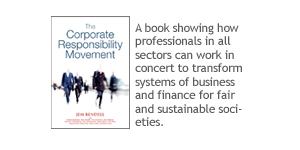Healing the whole – Insights from Congo
I’m writing from the Congo where we have been working with mining companies, communities and the government on promoting sustainable development. Working here has enabled me to affirm many of the systemic problems that I’ve observed with capitalism and will feed into the book I’m co-authoring with colleague Jem Bendell entitled “Healing Capitalism.” We believe the current economic system is cancerous, and we share the aim, with many of our clients and partners, that our work in corporate responsibility should promote greater well-being rather than anaesthetising the pain of our disconnection with community and planet. While many authors have proposed the same ‘cancer’ metaphor, for me it has an added depth as this time six years ago, I was diagnosed with the disease. As such the theme of ‘healing’ is a rich one in my life and an apt metaphor to reflect on our current economic system.
Some of you will be familiar with how a remission period of five years officially means that one is ‘cured’ of the ‘disease,’ as is my case. Looking back, what I find interesting is that during my convalescence and my subsequent return to health, as far as I can remember, no one around me mentioned the word ‘healing.’ Yet in whatever illness, personal or social, healing is key. Being Easter, it made me think about what the Christian tradition says about healing.
In “Binding the Strong Man: A Political Reading of Mark’s Story of Jesus”, author Ched Myers describes the symbolic meaning of Jesus’ actions in Mark’s Gospel. He explores the theme of healing through Jesus’ miracles. Citing the insights of theologian John J Pilch and his research into medical anthropology, he distinguishes between two approaches to the social meaning of sickness:
“Ethnomedicine places primacy on the culturally construed causes of illness…In contrast, biomedicine places primary emphasis on biological symptoms and pathogens…Disease derives from a biomedical perspective that sees abnormalities in the structure and/or function of organ systems. These are pathological states independent of whether or not they are culturally recognised. Disease affects individuals, and only individuals are treated. Illness is a sociocultural perspective that is concerned with personal perception and experience of certain socially dis-valued states including, but not limited to, disease. Illness inevitably affects others: the significant other, the family, the neighbourhood, the village…”
In this sense, we can get an understanding of the difference between ‘healing’ and ‘curing.’ Pilch goes onto say that,
“Jesus and all healers of that period could only perceive illnesses and not diseases [and therefore] Jesus’ activity is best described … as healing, not as curing [as] he provides social meaning for the life problems resulting from the sickness.”
As such, when authors use the disease ‘cancer’ as a metaphor to describe our current economic system, they refer to abnormal growth within that system and the socially dis-valued states it generates – illnesses such as inequality and poverty are two such examples.
As we seek to better understand the systemic implications of capitalism on business, people and community, we feel that ‘healing’ describes our intention. Our work, and our forthcoming book, not only addresses many of the symptoms of the ‘disease’, to use Pilch’s biomedical metaphor, but proposes strategies for business to become agents of ‘healing’ with the goal of restoring social wholeness, and thus greater well-being. In my case, having this context in mind has provided a powerful context for individual projects, as I question how our efforts and those of our clients, can best be agents of a wider healing.
For those of you who observe it, or appreciate festivals of reflection, Happy Easter!
Ian Doyle
Lifeworth Consulting







